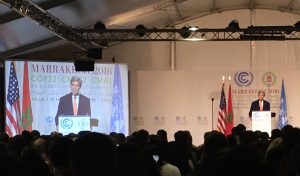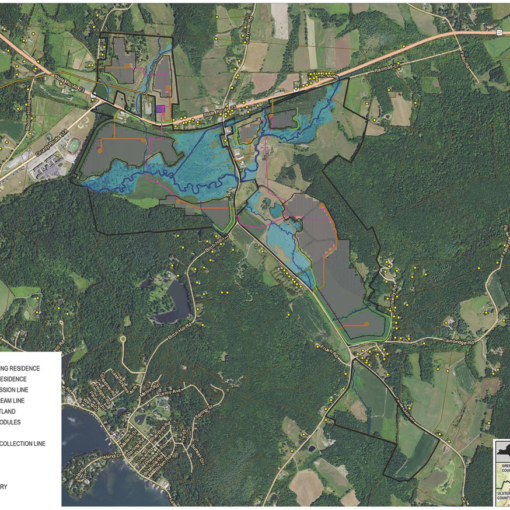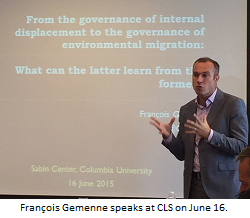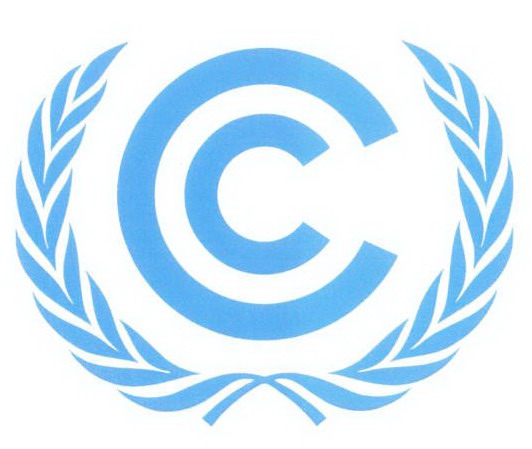
On Wednesday, U.S. Secretary of State John Kerry arrived in Marrakech for the 22nd meeting of the Conference of the Parties (COP) to the United Nations Framework Convention on Climate Change (UNFCCC), known as COP22. Hundreds queued for hours in the hot Marrakechi sun for an opportunity to hear Secretary Kerry speak at what will likely be his last COP in public office. I was one of the lucky ones allowed into the packed room, where he gave a rousing addressing, calling for urgent action by governments, businesses, and individuals to combat climate change.
Secretary Kerry began his address by declaring: “climate change is deeply personal to me, but its personal to everyone in this room. I know that. And we obviously want it to be just as personal for everyone in every room: men, women, children, businesspeople, consumers, parents, teachers, students, grandparents. Wherever we live, whatever our calling, whatever our background may be, this is an imperative.” Unfortunately, however, that is not yet the case.
Just hours before Secretary Kerry’s address, the Minister of Foreign Affairs of The Bahamas, Frederick Mitchell, spoke at the High Level Segment of COP22, telling the audience: “I have travelled a long way away from The Bahamas to come here . . . Most people in The Bahamas have no idea why I am here and if you ask them they probably will show a mild and fleeting interest, and ask what about jobs, healthcare, food, and the various necessities of life.” That this is true in a country like The Bahama’s, which has so much to lose from climate change, is both disappointing and concerning. As Minister Mitchell noted, “with eighty percent of [The Bahama’s] land within five feet or three meters of the sea, the sea level rise [caused by climate change] threatens our very existence.”
In The Bahama’s and many other countries, climate change is often seen as posing a distant and remote threat, which we needn’t worry about now. Most people are, understandably, more concerned about issues already directly affecting their lives. They question why we should prioritize action to mitigate climate change over efforts to create jobs and raise incomes. But, what if we could do both?
In his address on Wednesday, Secretary Kerry noted that “the world is now beginning to move forward together, towards a clean energy future.” This future is already becoming a reality in the U.S., where wind generation has tripled since 2008 and solar generation has increased thirty times over, creating thousands of well-paying jobs. Secretary Kerry expressed optimism that these trends will continue, as “[m]ost businesspeople have come to understand: investing in [wind and solar] energy simply makes good economic sense. You can make money. You can do good and do well at the same time.”
Secretary Kerry acknowledged that much of this progress “is due to President Obama’s leadership.” Whether it will continue after President Obama leaves office has been on the minds of everyone here at COP22. Yesterday, in the blue zone, climate skeptic Marc Morana shredded a copy of the Paris Agreement while yelling “this is what will happen once [President-elect] Trump takes office.” Trump has been vocal in his opposition to the Obama Administration’s efforts to combat climate change and has vowed to withdraw from the Paris Agreement. Even if that happens, however, it is clear that other countries will continue to move forward.
In the High Level Segment this week, numerous world leaders reaffirmed their commitment to the Paris Agreement, and vowed to do more to combat climate change. One of most ardent was French President François Hollande, who declared his country “ready . . . to increase [its] level of commitment” under the Paris Agreement. President Hollande acknowledged, however, that to achieve the Agreement’s goals “[i]t is essential that the United States, the world’s largest economic power, the second largest emitter of [climate-damaging] greenhouse gases, is meeting its commitments.” He indicated that “France, along with Europe, will conduct this dialogue with the United States, in openness, confidence, but with demand.”
How much, if at all, France and other countries can influence the Trump Administration’s climate policies remains to be seen. There is, however, optimism that progress can and will continue to be made regardless of its policy decisions. In his address on Wednesday, Secretary Kerry told the crowd “that the United States is right now, today, on our way to meeting all of the international targets that we’ve set, and because of the market decisions that are being made, I do not believe that that can or will be reversed.” Emphasizing that “[t]he private sector is the most important player” in the fight against climate change, Secretary Kerry urged business leaders, investors, workers, and consumers to continue “to act boldly on climate change and encourage others to do the same.” Only if that happens will we be able to protect Bahamians and others whose existence is threatened by climate change.
Romany Webb is a Research Scholar at Columbia Law School, Adjunct Associate Professor of Climate at Columbia Climate School, and Deputy Director of the Sabin Center for Climate Change Law.





